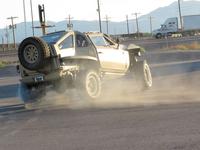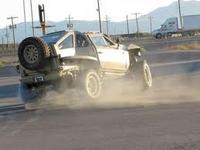-
Twenty-year anniversary of U.S. last full-scale nuclear test
The first U.S. nuclear test, code named Trinity, took place in southern New Mexico forty-seven years earlier, on 16 July 1945; in all, the United States conducted 1,030 nuclear tests – the last one, code-named Divider, took place twenty years ago, on 23 September 1992
-
-
Hezbollah drone represents changing technological landscape for Israel
Israel’s air defenses worked just fine in handling the drone launched by Hezbollah last week: the drone was picked up by Israeli surveillance as it was launched from southern Lebanon, then tracked as it flew south over the Mediterranean; it was allowed to enter Israeli air space so that after it was shot down, its remains could be collected and analyzed; still, the incident made many Israelis sit up and take notice; Israel, a country which has pioneered the use of UAVs as an integral part of military operations and which has held a monopoly on operating drones in the region, was forced to realize that is adversaries, too, now had access to the technology
-
-
Worries about UAV use in both military and domestic missions exaggerated

Dr. Steven P. Bucci, a Senior Fellow for Homeland Security & Defense Issues at the Heritage Foundation, talked with Derek Major, the Homeland Security News Wire’s executive editor, about the growing use of UAVs in both military and domestic law-enforcement missions; Bucci says that in targeting militants, American drone operators exercise a great deal of care to minimize, and eliminate if possible, death and injury to innocent civilians; he also says that the use of drones in domestic law-enforcement missions, if done properly, will not pose Big Brother risks, because drones may make surveillance easier and cheaper, but it will not give law-enforcement agencies any new authorities
-
-
Elected judges take tougher stance prior to elections
The last few months leading up to an election can be a critical, political game changer. One right or one wrong move can quickly change a candidate’s standing at the polls; new research suggests that judges who are elected, rather than appointed, respond to this political pressure by handing down more severe criminal sentences — as much as 10 percent longer — in the last three months before an election compared with the beginning of their terms
-
-
Engaging kids in science for as little as ten hours a year improves math, language scores

Researchers haves found that engaging elementary school students in science for as little as ten hours a year can lead to improved test scores in math and language arts; the students’ average percentile rank in math on a standardized test increased from 53.2 in the third grade to 63.4 in the fourth grade. The language arts percentile improved even more dramatically, rising from 42.8 in the third grade to 60.3
-
-
New military apparel repels chemical, biological agents
Scientists are developing a new military uniform material that repels chemical and biological agents using a novel carbon nanotube fabric; the material will be designed to undergo a rapid transition from a breathable state to a protective state; the highly breathable membranes would have pores made of a few-nanometer-wide vertically aligned carbon nanotubes that are surface modified with a chemical warfare agent-responsive functional layer
-
-
Evidence suggests that three-strikes law does not deter crime
Contrary to what police, politicians, and the public believe about the effectiveness of California’s three-strikes law, researchers have found that the get-tough-on-criminals policy voters approved in 1994 has done nothing to reduce the crime rate; a criminologist finds that decline in alcohol consumption is most responsible for decreasing crime rate
-
-
Different technologies aim to replace dogs as explosives detectors
Bomb-sniffing dogs are the best and most popular way for airport security quickly to detect anyone planning to bring explosives to an airport; scientists are trying to change that; Dr. Denis Spitzer and his colleagues, for example, are working on a sensor that will detect vapors of TNT and other explosives in very faint amounts; the device they are trying to create would replace dogs as the top bomb detecting method in the field
-
-
DARPA seeking tools for identifying hidden explosives at standoff
The threat to U.S. soldiers from improvised explosive devices (IEDs) is as varied as the makers of IEDs are resourceful in how they design and conceal the explosives; interdisciplinary teams needed to develop proof-of-concept demonstrations of technology for identifying presence of embedded explosives in opaque, high-water-content substances
-
-
Mice genetically modified to detect landmines

In another advancement in explosives detection, scientists have genetically modified mice to enable them to sniff out landmines; the GM mouse, known as MouSensor, may one day become a significant tool to help deal with the dangerous legacies of past wars
-
-
Sequestration-related defense budget cuts in 2013 to increase from $50.5 to $60.6 billion

Defense contractors are already worried about $50 billion dollars which would be cut from the defense budget on 3 January 2013 if the White House and Congress fail to reach an agreement on a deficit reduction plan; budget analysts point out that due to a provision in the Budget Control Act, another $10 billion will be added to that amount, bringing the total in defense cuts in 2013 to $60.6 billion
-
-
Mayor suggests student fee to hire more police, firefighters for local college’s sporting events
Morgantown, West Virginia mayor Jim Manilla wants to hire more police officers and firefighters to deal with street fires, riots, and other incidents following West Virginia University sporting events, and he wants the students to pay for it
-
-
Design competition for next generation ground vehicle opens

DARPA is calling on innovators with expertise in designing and engineering drive train and mobility systems collaboratively to design elements of a new amphibious infantry vehicle, the Fast, Adaptable, Next-Generation Ground Vehicle (FANG);the winning team will be awarded a $1,000,000 cash prize and will have its design built in the iFAB Foundry
-
-
To ensure success, Mexican drug cartels emulate corporate business model
When the subject of Mexican drug cartels come up, most people think of bloody violence, pounds of cocaine or marijuana, and so much money people have to weight it instead of counting it; what people do not think about is the business models the cartels emulate – and they emulate the models and management charts of typical American corporations
-
-
New approach to identifying remains allows reopening of cold cases
In an effort to identify the thousands of John/Jane Doe cold cases in the United States, researchers have found a multidisciplinary approach to identifying the remains of missing persons; using the new method, the researchers were able to identify the remains of a missing child forty-one years after the discovery of the body
-
More headlines
The long view
Tantalizing Method to Study Cyberdeterrence
Tantalus is unlike most war games because it is experimental instead of experiential — the immersive game differs by overlapping scientific rigor and quantitative assessment methods with the experimental sciences, and experimental war gaming provides insightful data for real-world cyberattacks.
Using Drone Swarms to Fight Forest Fires
Forest fires are becoming increasingly catastrophic across the world, accelerated by climate change. Researchers are using multiple swarms of drones to tackle natural disasters like forest fires.
Testing Cutting-Edge Counter-Drone Technology
Drones have many positive applications, bad actors can use them for nefarious purposes. Two recent field demonstrations brought government, academia, and industry together to evaluate innovative counter-unmanned aircraft systems.
European Arms Imports Nearly Double, U.S. and French Exports Rise, and Russian Exports Fall Sharply
States in Europe almost doubled their imports of major arms (+94 per cent) between 2014–18 and 2019–23. The United States increased its arms exports by 17 per cent between 2014–18 and 2019–23, while Russia’s arms exports halved. Russia was for the first time the third largest arms exporter, falling just behind France.
How Climate Change Will Affect Conflict and U.S. Military Operations
“People talk about climate change as a threat multiplier,” said Karen Sudkamp, an associate director of the Infrastructure, Immigration, and Security Operations Program within the RAND Homeland Security Research Division. “But at what point do we need to start talking about the threat multiplier actually becoming a significant threat all its own?”
The Tech Apocalypse Panic is Driven by AI Boosters, Military Tacticians, and Movies
From popular films like a War Games or The Terminator to a U.S. State Department-commissioned report on the security risk of weaponized AI, there has been a tremendous amount of hand wringing and nervousness about how so-called artificial intelligence might end up destroying the world. There is one easy way to avoid a lot of this and prevent a self-inflicted doomsday: don’t give computers the capability to launch devastating weapons.
